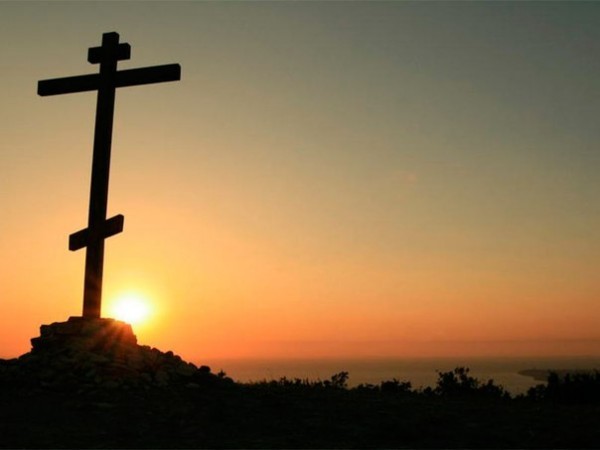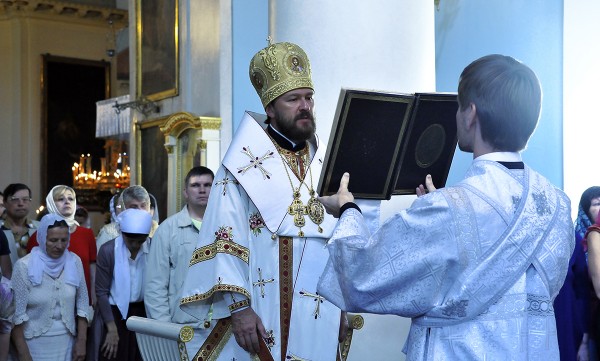Our lives make sense. This may not always seem to be true, but it is. For each of us, there are inner principles that guide our decisions and prioritize our actions. Life is not entirely random.
Much of that inner sense of things is not conscious. The day becomes very busy, and we can’t stop and analyze each action and think about its meaning and purpose. Sometimes, you just have to drive the kids to school, go to the store, the doctor, two other places, and do a dozen things at home and have dinner on the table. Our inner sense on many days is just survival.
We are not particularly burdened by our hardships, not when compared to the stretch of history. But we often neglect the true principles of our lives. “Necessity” is a very empty principle for getting through the day.
The central point of the Christian life is the Cross. It is more than a single event in history. It is The Event in history and continues as an eternal presence. The Cross of Christ is the revelation of God’s true life in the world. The Cross is the proper shape of our existence. But what does that mean? Especially on a daily basis?
For one, it means that our true lives are not centered in ourselves. We are not created to be self-fulfilling. Our lives, especially in difficulty, find their right shape as we give ourselves to others. The Other and not the Self is the way of the Cross. This is extremely counter to our culture. Of course, the fullness of the Other is God. St. Paul says that our “true life is hid with Christ in God” (Col. 3:3). We can only find ourselves outside of ourselves. There are very practical ways of applying this in our lives.
Prayer is directing our hearts outside of ourselves and towards God. Pray.
Kindness places the other ahead of ourselves. Be kind.
Giving thanks acknowledges that our lives are not the products of our own efforts, but a gift from God. Give thanks always, for all things.
Forgiveness accepts the fact that our actions have consequences and the lives of those around us. The refusal to forgive is a radical separation of ourselves from others. Forgive. Forgive everyone for everything.
We do not exist to consume. We have our daily needs. Satisfying them is enough. If our true life is found outside of ourselves, then sharing what we have with others is the most natural thing to do with our possessions. Give stuff away. The more, the better.
Lying is the ultimate act of selfishness. It is an attempt to create a false reality that exists only in our own perverse attempt to remake the world and avoid the truth. Do not lie. Do not participate in the lie.
The Cross is the way of life. Learn to love the Cross. Make the sign of the Cross frequently. Indeed the Fathers say we should cross ourselves before beginning anything. And when we are done, we cross ourselves in thanksgiving. The Cross is the remembrance of God and the truth of our lives. Our lives are not our own. They belong to the Crucified God who invites His friends to join Him in the most pure act of love.
Love God. Love His Cross.
Metropolitan Hilarion: Every human being has an opportunity to follow Christ
METROPOLITAN HILARION (ALFEYEV) | 25 AUGUST 2015
On 23 August 2015, 12th Sunday after Pentecost, commemoration day of St Sabbas of Storozhi, Metropolitan Hilarion of Volokolamsk, chairman of the Department for External Church Relations of the Moscow Patriarchate, celebrated the Divine Liturgy at the Church of the “Joy to All the Afflicted” Icon of the Mother of God in Bolshaya Ordynka Street, Moscow.Metropolitan Hilarion: Every human being has an opportunity to follow Christ
Concelebrating with the archpastor were Archimandrite Andrei (Krekhov), father superior of the Monastery of the Holy Trinity in the city of Ryazan; Archpriest Chad Hatfield, Chancellor of St Vladimir’s Orthodox Theological Seminary in New York (Orthodox Church in America); and clergymen of the church.
A delegation of the Anglican Church in North America, led by its primate, Archbishop Dr. Foley Beach, attended the service.
After the Liturgy, Metropolitan Hilarion delivered an archpastoral homily, saying in particular:
“This Sunday, when we are still celebrating the Feast of the Transfiguration of Our Lord and Saviour Jesus Christ, we have heard a lesson from the Gospel according to Matthew about a young man who came to the Lord and asked Him what he had to do to inherit the Heavenly Kingdom (Cf. Mt. 19:16).
“As you know, the commandments of the Law of Moses were written on two tables of stone; supposedly, the first four commandments pertaining directly to the veneration of God were written on one of the tables, while the other had the commandments dealing with relationships between people.
“Answering to the young man, the Lord Jesus Christ cited those commandments from the Law of Moses that deal with relationships between people. The young man said in response, “All these things have I kept from my youth up: what lack I yet?” The Lord said to him, “If thou wilt be perfect, go and sell that thou hast, and give to the poor, and… come and follow me” (Mt. 19:20-22).
“Of course, Christ felt that the young man was rich and that for him to sell his property and give the money to the poor meant to leave everything in order to follow Him. We know that the Lord did not call everyone He met to follow Him. When Christ was walking by the sea of Galilee and saw fishers there, He chose four of them, saying, “Follow me, and I will make you fishers of men” (Mt. 4:19). When someone He had called said, “Suffer me first to go and bury my father,” He replied to him, “Let the dead bury their dead” (Mt. 8:21-22).
“The rest of people hear Christ’s another words. Firstly, He calls upon them to fulfill the commandments which had been the foundation of human society for centuries. Secondly, He says that salvation, impossible for men to attain on their own, is possible with God. Therefore, if the man is not ready to give all his possessions to the poor in order to follow Christ it does not mean that the doors to the Heavenly Kingdom are closed for him.
“The Lord does not demand that all people should give up everything they have. He expects each of us to regard Him and His commandments as the cornerstone of our life and to use what we have for our own benefit and for the benefit of our neighbours. It relates not only to material things. Some people receive from the Lord wealth, others, intellect, still others, compassionate and merciful heart. Every man has something to share with his neighbours. After all, every human being has an opportunity to follow Christ.
“Let us live according to the commandments of Our Lord Jesus Christ. Let us learn lessons from the Gospel readings we hear every Sunday. And when we cannot go to church, let us at home read the pericope intended for a particular day of the liturgical year. Thus we will be able to read the whole Gospel at least once a year and take in all the wisdom, strength and grace which are poured out to us from the divinely-inspired pages written by the Apostles through whom Our Lord Jesus Christ Himself speaks to us. Amen.”
Metropolitan Hilarion also greeted the members of the delegation of the Anglican Church in North America, led by Archbishop Foley Beach, and Archpriest Chad Hatfield (Orthodox Church in America) who was accompanying the delegation. The DECR chairman said, in particular, “Our guests represent a conservative wing of the Church of England, which does not accept the novelties made manifest, to our regret, in the Anglican Communion and Protestant communities.” Metropolitan Hilarion mentioned that during his visit to the United States he had been to Nashotah House Theological Seminary, WI, the stronghold of traditional Anglicanism. On 26 October 2012, Metropolitan Hilarion of Volokolamsk was honoured the degree of doctor honoris causa at the Nashotah House Seminary.










No comments:
Post a Comment